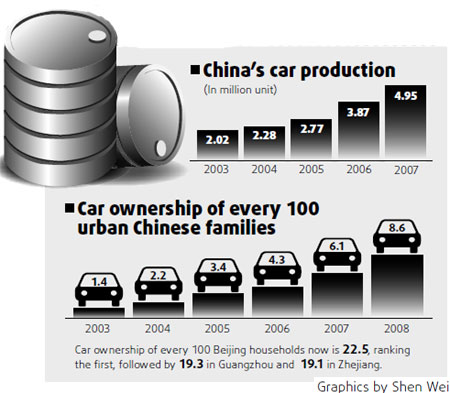The invisible hand
The increase of the fuel tax, therefore, is a proper way to cope with the situation, as it takes effect through "the invisible hand", rather than "the visible hand", or mandate of government.
Under the "use more, pay more" principle, vehicle owners would be required to shell out more money in fuel consumption charges. The currently prevailing high-emission vehicles would become undesirable, while low-emission vehicles would be increasingly favored by consumers.
The effect of the fuel tax has been proven by foreign countries such as Germany, which imposed a high fuel tax and has seen a 11.8 percent drop in oil demand from 2002 to 2007, while oil demand in the US increased 4.7 percent during the same period, due to its lower fuel taxes. China in comparison saw a 48.5 percent rise in oil demand.
The new policy is a significant step the authorities have made to stimulate more efficient use of energy and to transform China into a conservation-minded society.
Paralleled measure
Meanwhile, parallel measures have been designed in an effort to moderate the likely social impact.

The draft pledged to use part of the tax revenues raised from the plan to cover expenditures on road and waterway maintenance and management and subsidize losses suffered by local governments. It is vital to effectively coordinate interests between the central and local governments, thus a joint force could be used to better implement the reform.
Another part of the tax revenues will be used to subsidize farmers and disadvantaged people affected by the reform, a measure that demonstrates the government's resolve to safeguard the benefits of ordinary consumers.
What the middle and low income earners are mostly concerned with is whether the rise in oil prices will push up the inflation, which plagued them in the past months. In fact, even if the fuel consumption tax increases, the CPI will not rise too much, since citizens' expenditures on gasoline contributes less than 3 percent to China's consumer inflation, not to mention the slump in oil consumption as a result of oil price increases.
Attention should also be paid to public transportation, especially the taxi industry, which deserves a special allowance because cabbies are complaining about their meager earnings despite hard work, partly due to rising oil prices.
The author is a senior expert with the National Bureau of Statistics. Zheng Yangpeng of Peking University also contributed to the article. The opinions expressed are their own.
(China Daily December 15, 2008)